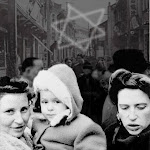
Vivian's book has always guided our process. Even at this late stage (we move into the Al Green Theatre tomorrow!) I find myself returning to the book again and again.
We have been developing Ten Green Bottles for the past ten months in two different workshops. The first workshop was very broad and conceptual - the cast, the directors, and the designer in a room together, playing games, establishing relationships, taking risks. By the week's end, we had, in one shape or another, dramatized almost every moment of Vivan's epic story.
The second workshop was about re-evaluating and distilling what we had, and turning it into an eighty minute piece of theatre. We got rid of most of the book's secondary characters (how I still miss Marco, Herte, and the Secretary!), played around with the piece's chronology, and started experimenting with suitcases as props and scenery.
The past three weeks have finally brought us into full-fledged rehearsal. But things are still evolving and changing.
I have pages and pages of notes that I've been making on Poldi and his story since our very first day in July. When I get stuck, I re-read what I've written, and sometimes things that I discovered all those months ago will help me get back on track. I've gone back and read certain chapters of Vivian's book again and again to help ground myself in the worlds of Shanghai and Poland. And lots and lots of movies. Mark has been excellent in suggesting lots of great foreign titles to us, and they've been a great tool in terms of imagery and atmosphere.
What is your favourite scene? What are some of your favourite lines?
I rarely get to play out a full-fledged love story on stage, so I do love all my scenes with Nini and exploring every facet of Poldi and Nini's beautiful, complex relationship. I'm still making new discoveries every day.
One of my favourite lines was cut last week! Erna (Lauren Brotman) said "Even Vienna's not Vienna anymore" in the opening scene. Certain lines and moments were slowing the action down and had to be cut, and that's just the nature of the beast. But Lauren and I have been scheming and conspiring to find a new place for that line somewhere else in the show! Watch out!
What challenges does the production present for you as an actor?
Ten Green Bottles has become a fluid, very movement-heavy piece of theatre. We've been working very hard with Clare Preuss to create some really exciting dance and movement pieces. That kind of stuff always freaks me out and excites me in equal parts, so it's been a particular challenge for me. And I think everyone's big, general challenge has been to tell this epic, tragic, beautiful, funny, moving story in just one hour and fifteen or so minutes. I'm still trying to infuse each moment with as much drive and subtext as I possibly can.
One of the great gifts this show has given me is working with this amazing and inspiring group. Every day in rehearsal I get pushed and challenged by them to do the best work I can possibly do. So they make every day a challenge for me, in the best possible sense.
And as for who's playing Poldi in the movie...Sascha suggested Clive Owen, but I'm thinking more along the lines of Liev Schreiber or Jeremy Northam



.jpg)
.jpg)